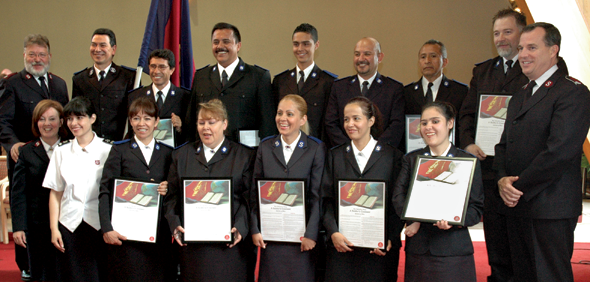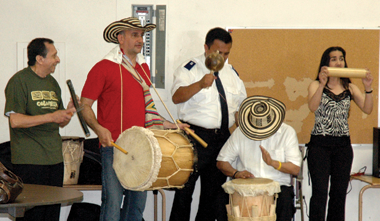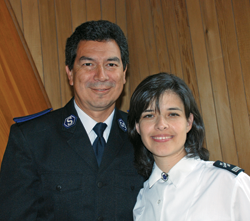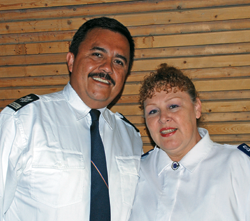 For decades, the South American country of Colombia has experienced civil unrest and widespread population displacement. Just as Canada opens its heart to people dislodged by war, The Salvation Army does likewise. Yorkminster Citadel in Toronto recently enrolled 11 Spanish-speaking soldiers, 10 from Colombia and one from Mexico. These new soldiers have not only found a safe home in Canada, but an eternal refuge in Jesus Christ.
For decades, the South American country of Colombia has experienced civil unrest and widespread population displacement. Just as Canada opens its heart to people dislodged by war, The Salvation Army does likewise. Yorkminster Citadel in Toronto recently enrolled 11 Spanish-speaking soldiers, 10 from Colombia and one from Mexico. These new soldiers have not only found a safe home in Canada, but an eternal refuge in Jesus Christ.
In 2008, Yorkminster Citadel participated in a vision review exercise. “Our ministries were examined for effectiveness and sustainability,” says Major Len Ballantine, corps officer. “Key to our breakthrough was our corps' Spanish fellowship. It was precious, but fragile and challenging because of language and cultural differences. The vision process enabled the corps to recognize the fledgling Spanish ministry's potential for our growth and vitality.”
Fabio Correa, community and family services director, and his wife, Angelica, had provided oversight to the Spanish ministry for some time. Encouraging signs of potential were evident as immigrants, refugees and others came for help. Though the link from family services to corps participation was bearing fruit, there were many obstacles. “The religious culture of our Latin American friends is Roman Catholic,” explains Major Ballantine. “Many of those arriving in Canada had only a nominal understanding of the Church, Jesus, salvation and The Salvation Army. Consequently, the early days of this ministry were somewhat like a revolving door. We were all learning, but not fast enough to know how to keep those who were won to the Lord.”
 The corps faced many challenges in making this outreach ministry successful: the fear of failure and being willing to end ineffective programs; finding a balance in worship where English-Spanish applications were natural and effective; learning Spanish songs and including Spanish testimonies, prayers and dramatic presentations in conventional Sunday worship. Other issues included creating fellowship occasions where Canadian and Spanish cultures could be integrated, but also other times when they could be separate. This worked well during the Alpha course, which fostered supportive cross-cultural relationships and resulted in significant decisions made for Christ.
The corps faced many challenges in making this outreach ministry successful: the fear of failure and being willing to end ineffective programs; finding a balance in worship where English-Spanish applications were natural and effective; learning Spanish songs and including Spanish testimonies, prayers and dramatic presentations in conventional Sunday worship. Other issues included creating fellowship occasions where Canadian and Spanish cultures could be integrated, but also other times when they could be separate. This worked well during the Alpha course, which fostered supportive cross-cultural relationships and resulted in significant decisions made for Christ.
Yorkminster Citadel is learning to navigate the tension between duality and unity—between two cultures and languages. “We are all encouraged by the fervour and deep sincerity of the new Christians,” says Major Ballantine. “We are not a Spanish corps and a Canadian corps—we are one in Christ. New immigrants are coming to Canada. New Christians are being born and we have new soldiers who want to work and evangelize under the banner of The Salvation Army. We can only benefit as a corps and as a people from this.”
Top photo: New soldiers with corps leaders, Spanish pastors and Lt-Col Floyd Tidd, DC, Ont. CE Div; bottom: Members of the church engage in an impromptu rhythm ensemble
 Fabio and Angelica Correa
Fabio and Angelica Correa
“Colombian guerrillas wanted me to provide them with medicines from the pharmaceutical company where I was CEO and part owner,” explains Fabio Correa. “Because I refused, they threatened to kill me and my family. I travelled to the United States with my wife, Angelica, and our two children on a supposedly regular business trip and sought political asylum in Atlanta.” When a Colombian friend invited him to attend worship at a Spanish-speaking Salvation Army congregation, Fabio initially resisted but he and his wife eventually attended and became soldiers.
The Correas sensed God's call to apply for training as Army officers, but their political status prevented them from being accepted as candidates. Because of the lengthy process for receiving political asylum in the United States, they came to Toronto and applied for Canadian citizenship. Fabio is now the community and family services director at Yorkminster Citadel. Angelica interprets in Sunday worship and sometimes preaches in the Thursday night Spanish service. “The conviction about full-time ministry has pursued us to Canada,” says Fabio, “and we have applied to become aux-captains in the Canada and Bermuda Territory.”
 Rodolfo and Olga Ramon
Rodolfo and Olga Ramon
Rodolfo Ramon had worked for the Colombian government, but he and his wife, Olga, left Colombia for security reasons. A person in a prayer group they were attending in Toronto invited them to Yorkminster Citadel. “I prayed: 'God, what is the right place for us?' ” says Rodolfo. “We believe God has called us to the Army and to Yorkminster Citadel.”
“Wearing the Army uniform signifies a big commitment to The Salvation Army and to the world,” says Olga. “Being a uniformed soldier means I am identifying with Jesus' calling to help others.” The Ramons assist many newcomers to Canada, praying with them and helping them to fill out government forms, access support programs, and obtain apartments and furniture.









Leave a Comment